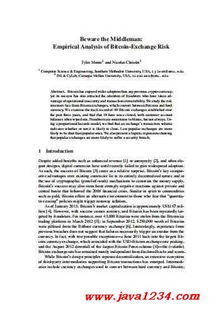List of Bitcoin Exchange-Traded Funds (ETFs), Understanding Their Impact on the Crypto Market
In recent years, Bitcoin Exchange-Traded Funds (ETFs) have captured significant attention in the investment community. These financial instruments offer a unique opportunity for investors to gain exposure to Bitcoin without the complexities of directly managing the cryptocurrency. This article will explore various Bitcoin ETFs available in the market today, their structure, and their potential impact on the overall crypto market.
In recent years, Bitcoin Exchange-Traded Funds (ETFs) have captured significant attention in the investment community. These financial instruments offer a unique opportunity for investors to gain exposure to Bitcoin without the complexities of directly managing the cryptocurrency. This article will explore various Bitcoin ETFs available in the market today, their structure, and their potential impact on the overall crypto market.

The Growing Popularity of Bitcoin ETFs
As the cryptocurrency market matures, the demand for regulated financial products has led to the emergence of Bitcoin ETFs. These ETFs are essentially investment funds that track the price of Bitcoin and are traded on traditional stock exchanges. This allows investors to buy and sell shares of the ETF without needing to hold Bitcoin directly, making it a more accessible option for many.
Below is a list of some prominent Bitcoin ETFs that have made headlines since their inception:
- ProShares Bitcoin Strategy ETF (BITO)
- Valkyrie Bitcoin Strategy ETF (BTF)
- VanEck Bitcoin Strategy ETF (XBTF)
- Grayscale Bitcoin Trust (GBTC) – Although technically not an ETF, it operates similarly.
- Purpose Bitcoin ETF (BTCC) – The first Bitcoin ETF in North America.
Each of these ETFs has unique features that cater to different investor needs and strategies. The ProShares Bitcoin Strategy ETF, for instance, is designed to provide exposure to Bitcoin futures contracts, while the Purpose Bitcoin ETF holds actual Bitcoin in its reserves.

Key Benefits of Investing in Bitcoin ETFs
Investing in Bitcoin ETFs presents various advantages. Firstly, they offer greater regulatory oversight compared to direct cryptocurrency investments, which may appeal to risk-averse investors. Secondly, Bitcoin ETFs can be incorporated into traditional investment portfolios, allowing for more diversified strategies. Moreover, they simplify the process of investing in Bitcoin, eliminating the need for individuals to manage private keys or wallets.
However, it’s essential to consider the potential risks associated with Bitcoin ETFs, such as fund management fees and the inherent volatility of Bitcoin prices. Investors should conduct thorough research and consider their risk tolerance before investing in Bitcoin ETFs.

The Future Landscape of Bitcoin ETFs
Looking ahead, the future of Bitcoin ETFs appears promising. As regulatory frameworks continue to evolve, we may see more Bitcoin ETFs entering the market, potentially catering to different investor profiles and strategies. Additionally, as institutional interest in Bitcoin increases, the acceptance and utilization of Bitcoin ETFs could significantly influence institutional investments in the cryptocurrency sector.
In conclusion, Bitcoin ETFs provide an innovative way for investors to gain exposure to cryptocurrency while benefiting from the regulatory framework of traditional financial markets. As more products emerge, understanding the nuances of each ETF will be critical for investors looking to navigate the evolving landscape of cryptocurrency investments.




